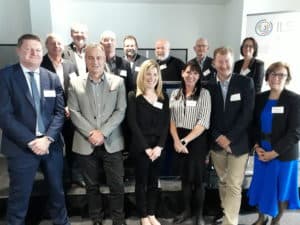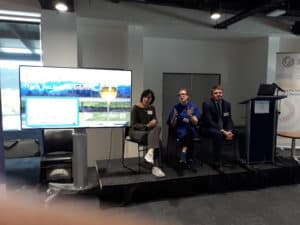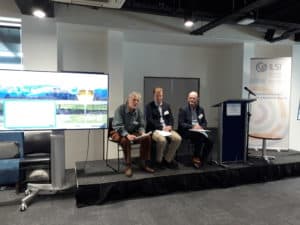Wellington, New Zealand
31/10/2019
Flax and Fern Room, Massey University, Entrance A, Wallace Street, Mount Cook, Wellington
BACKGROUND
Whole Genome Sequencing (WGS) and Next Generation Sequencing (NGS) are having significant impact on the ‘forensic’ analysis of pathogens and the identification of the source of contamination of foodborne illness and public health events. These techniques are being used globally to track and determine how contamination with human pathogens such as Campylobacter spp., Salmonella spp. and Listeria spp. has arisen and allowed more precise tracking.
WGS /NGS can increase accuracy in monitoring foodborne bacterial contaminations and pathogen-driven public health events. It can provide detailed insights as to who/what/when and how such contamination has occurred. In New Zealand, uptake of WGS has been limited thus far, but it is starting to change as companies, health providers and governments realize the power of these techniques. The rapid development of WGS and NGS is enabling a move from research to industry and public health applications and has implications for global food safety. We invite you to join us at this implementation-oriented conference.
WHAT AREAS WILL BE COVERED
-
- What are WGS and NGS? The scientific essentials of WGS and NGS and their application to improve public health and food safety.
- Applications and use in industry: Hear directly from industries' experience including dairy, horticulture and seafood case studies and learn how WGS/NGS can build consumer confidence in your products/brands.
- Applications and use in public health in New Zealand, Australia and USA.
- The benefits, hurdles and risks? Data protection, intellectual property and risk management issues.
- The regulatory perspectives? National, international and legal implications.
ORGANIZERS
ILSI SEAR Australasia
New Zealand Food Safety Science & Research Centre
CSIRO
with support from :
AsureQuality
Illumina
ESR (Institute of Environmental, Science and Research)
WHO SHOULD ATTEND?
- Industry professionals (including scientific equipment suppliers)- to see how WGS and NGS is being used to support food safety and how regulators might use the technology
- Science and academic community - to share current science status and inform the science community, industry and government about developments, what is available today an what are future developments.
- Government agencies, public health policy makers and officials - to understand the role WGS/NGS might play in compliance, improving food safety and protecting public health
- Consumer-focused NGOs - to gain insight into how consumer safety might ve improved by these new technologies.
PROGRAM
Whole genome sequencing of foodborne pathogens: from global to local applications - by Prof. Nigel French, Massey University, New Zealand.
Implementation of WGS in FDA's Food Program: past, present, and future - by Prof. Steve Musser, Food and Drug Administration, USA.
Whole genome sequencing - learning by doing - Dr. Jeremy Hill, Fonterra Cooperative Group and Riddet Institute, Massey University, New Zealand.
How whole genome sequencing can improve food safety outcomes for seafood and horticulture industries - by Mr. Graham Fletcher, Plant & Food Research, New Zealand.
WGS, part of the solution or part of the problem - using WGS to increase confidence in process outcomes - by Mr. Roy Briggs, Briggs Food Consultancy, New Zealand.
How can WGS impact on consumer confidence in your products/ brands? - by Prof. Phil Bremer, University of Otago, New Zealand.
Using genomic to track antimicrobial resistance in enteric pathogens - by Assoc. Prof. Deborah Williamson, Doherty Institute, University of Melbourne, Australia.
The role of WGS in the identification and investigation of food and waterborne disease outbreaks - by Dr. Brent Gilpin and Dr. Sarah Jefferies, Institute of Environmental Science and Research, New Zealand.
Transitioning from conventional molecular testing to whole genome sequencing in a public health microbiology laboratory: lessons on embracing a disruptive technology - by Assoc. Prof. Amy Jennison, Queensland Department of Health Australia.
Click here for bios of each speaker and abstracts
Panel discussion - Moderator: Prof. Phil Bremer
Data protection, Intellectual Property, and Risk Management Issues
Presentations from:
Mr. Glen Neal, FSANZ. (View presentation)
Ms. Kate McHaffie, Litigation Principal, AJ Park Law, New Zealand. (View presentation)
Dr. Anne-Marie Perchec Merien, Ministry for Primary Industries, New Zealand. (View presentation)
Panel discussion - Moderator: Prof. Phil Bremer
Panel members:
Prof. Nigel French
Dr. Brent Gilpin, ESR
Dr. Tom Kiedrzynski, Ministry of Health, New Zealand
PROGRAM FLYER available here, click here.
E-FLYER
Download E-flyer: Click here
For more details, please contact ILSIAasia@ilsi.org.au.

Photo of Chairs, Speakers and the Organizers

